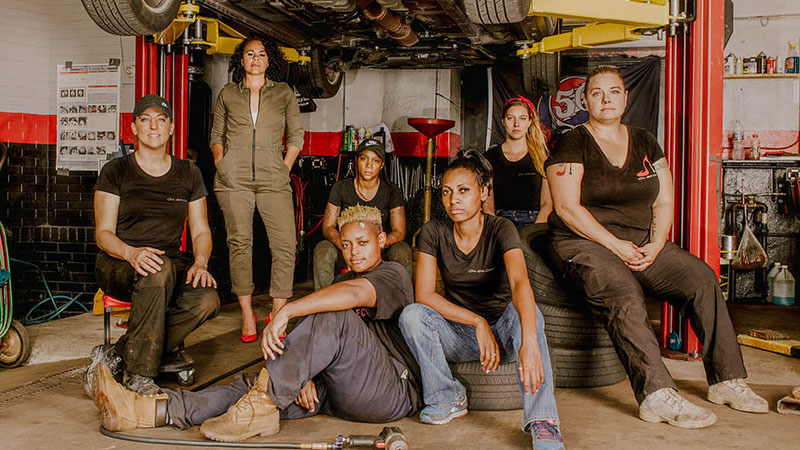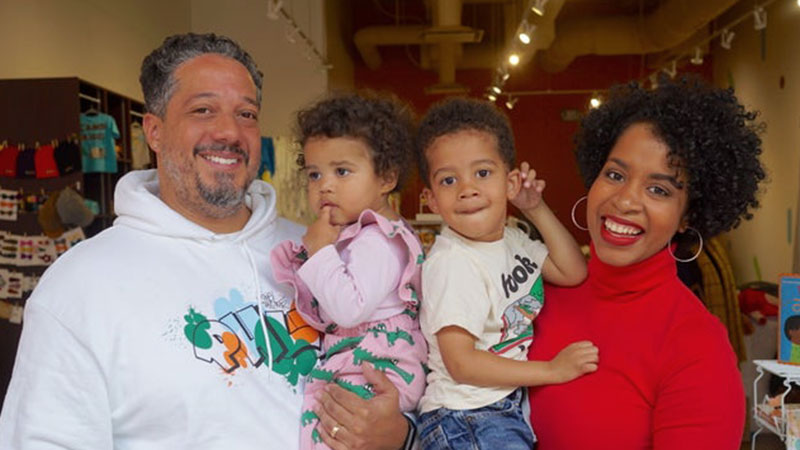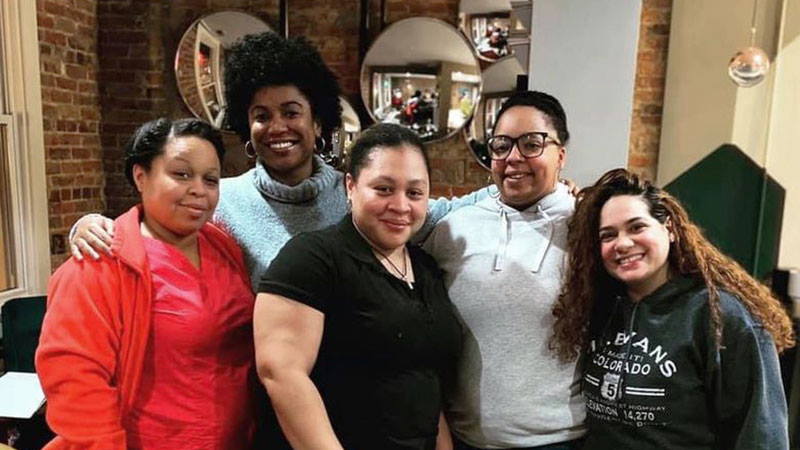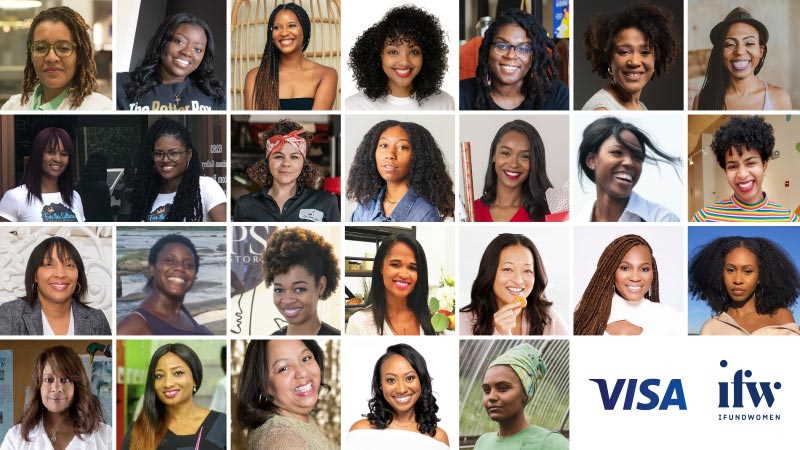Innovative female founders break a new glass ceiling: representation
25 inspiring Black female entrepreneurs receive grants from Visa and IFundWomen to help grow their businesses

Congratulations to the winners of the IFundWomen Grant Program for Black women-owned businesses! Scroll down to the bottom of this post to see the complete list.
Women are the key decision makers in 85 percent of car purchases yet few of them lead the industry.1 From executives to mechanics, the auto industry is dominated by men and this lack of representation was something Patrice Banks, an engineer by trade, wanted to change. “I thought it was insane that I’m the number one customer and I hate my experiences [at dealers and repair centers] and I don’t feel confident about my car and I know other women feel that way,” said Banks.
Frustrated by the lack of female mechanics, Banks decided to head back to school to learn the auto mechanic trade and eventually founded Girls Auto Clinic repair center in Upper Darby, Pa. The twist? This auto repair shop is fully owned and operated by female mechanics. There’s also a salon where you can get your nails done while you wait for your repair. Banks hosts monthly workshops, often clad in her signature red heels, to teach women and men how to care for their cars and is the author of Girls Auto Clinic Glove Box Guide too. “It's supposed to be kept in your glove box. You're supposed to really have it be handy, not keep it on your bookshelf,” she said.
Banks is one of 25 women who received a $10,000 grant and an annual coaching membership to IFundWomen through the Visa and IFundWomen Black Women-Owned business grant program, part of Visa’s larger commitment to support the Black community and 50 million small and micro businesses (SMBs) worldwide. The number of businesses launched by BIPOC women has more than doubled since 19972. But they’ve been hit the hardest by the COVID-19 pandemic, in part, due to lack of easy access to funds.
“When Visa and IFundWomen started talking about why they picked me, I just broke down a bit because it's hard,” said Banks. “It feels good to know that people believe in you. You're on the right path.”
Positivity and inclusivity
“Everyone in retail knows after the holidays, January and February are very slow,” said Keewa Nurullah, co-owner of the Chicago-based children’s boutique Kido and another Visa and IFundWomen grant recipient. “So the timing of the pandemic in March was really hard.”
She and her husband closed up shop and immediately pivoted to increase their online sales. “Our clothing sales really dipped because people were in their pajamas all day so we ordered more puzzles, more games, more toys, more things that people could use to entertain their kids at home,” she said.

Nurullah grew up on the South Side of Chicago and comes from a lineage of entrepreneurs; her grandfather and great-grandfather both owned tailoring shops. Kido was her way of bringing a positive light to neighborhoods that had been blighted by systemic inequities. “It was very important to me to have a home for Kido so that the light and color and bright positivity that we were spreading had a physical space to it.”
That positivity turned into community events like Baby Soul Jams, which brought families from all walks of life together for day parties. “We got such good feedback and it was so successful that it ended up being a quarterly family day party.” Gathering families for festive events is one thing Nurullah said she misses most during this time and it makes Kido more than just a retail shop, but a place to learn “about other cultures, get to know your neighbors, and raise better citizens in the process.”
“Some people might say that entrepreneurship ages you, but I think it keeps you young because you're forced to play by play, make these crazy decisions for your business that affect everything,” said Nurullah. “They affect your life, your family, and the potential for your future to really be determined by your own blood, sweat and tears, I think that is the most gratifying.”
Team player
Starting a business was more like bridging a community for Samantha Griffin, founder of DC Metro Maternity, which offers birth and postpartum support to women of color in Washington, D.C. through a network of certified doulas. “It’s better to be in a team,” she said, “You’re not supposed to have a baby alone. I don’t think you should be a doula alone.” Her team effort to address the racial and ethnic disparities in pregnancy-related deaths is one reason why Griffin was awarded the Visa and IFundWomen grant, which also provides access to business coaching and educational resources to help founders run and grow their businesses.

That team philosophy has also kept Griffin’s business running during these challenging times. Griffin and her team had to transition practically overnight to virtual meetups with clients, hosting classes online and even going live on social media to give nervous moms-to-be a calming presence in the face of COVID-19. In recent weeks they have resumed some in-person client meetings while maintaining strict health protocols.
But Griffin sees a silver lining in the midst of this pandemic. She said it has laid bare many challenges her clients face, helping her think about what she can do to make their lives better. Her plans for the $10,000 Visa and IFundWomen grant? To use the money to launch and market an online course that guides women with resources and answers to their most important pregnancy questions.
“Someone could watch this and know exactly what they should be asking their doctor, which books they might want to read, which positions they should be practicing,” said Griffin. She has no plans to slow down in her quest to help women of color enjoy positive, stress-free pregnancies.
“It’s not like any of us [entrepreneurs] decided to pack up shop and sit in our house,” she said. “We’re all doing this, and we all together can find a way forward.”
Banks echoes that sentiment, “To be a good entrepreneur, you have to be a dreamer. You have to actually believe in the things that you're dreaming and believe in yourself. And anybody knows that if you're going to create anything great or be great, you have to be consistent and persistent, and show up, even when things are hard.”

Congratulations to all the Visa and IFundWomen grant recipients:
(first row, left to right)
Brandy Archie, Founder & CEO, AccessAble Living
Tameka Bost, Founder, The Better Box
Jasmine Marie, Founder, Black Girls Breathing
Alexis Perkins, Founder and Creative Director, Chair One Fitness
Lorielle Hollaway, Owner, Cultured Books
Samantha Griffin, Owner, DC Metro Maternity
Chimere Faulk, Founder, Dr. Locs
(second row, left to right)
Shantika Lynch & Cyndrea Mathews, Co-Owners, For the Culture Beauty Supply
Patrice Banks, Founder & CEO, Girls Auto Clinic
Trinity Mouzon Wofford, Co-founder, Golde
Jacquelyn Rodgers, Founder, Greentop Gifts
Keanna O’Quinn, Founder & CEO, Honey + Vinyl
Keewa Nurullah, Owner, Kido
(third row, left to right)
Gina VanCant, Founder, Milk Mission
Naa-Sakle Akuete, Founder & CEO, Mother’s Shea
Aurelia Edwards, Founder & CEO, Nailstry
Itika Oldwine, Founder, Oldvine Florals
Denise Woodard, Founder & CEO, Partake Foods
Danyel Surrency Jones, Co-Founder & CEO, PowerHandz
Alicia Scott, Founder & CEO, Range Beauty
(fourth row, left to right)
Kim Magloire, President and CEO, SciTech Kids
Ehime Eigbe, Founder & CEO, Sweetkiwi
Kristen Stewart, Owner, Three Little Birds
Brandelyn Green, Founder & CEO, Voice of Hair
Ysanet Batista, Founder, Woke Foods
To learn more about the Visa and IFundWomen grant program, visit www.ifundwomen/visa.
______________
1 NPR: Women Women Dominate Car-Buying Decisions; Few Hold Auto Executive Job (2015)↩
2 United States Census Bureau: Number of Women-Owned Employer Firms Increases (2018)